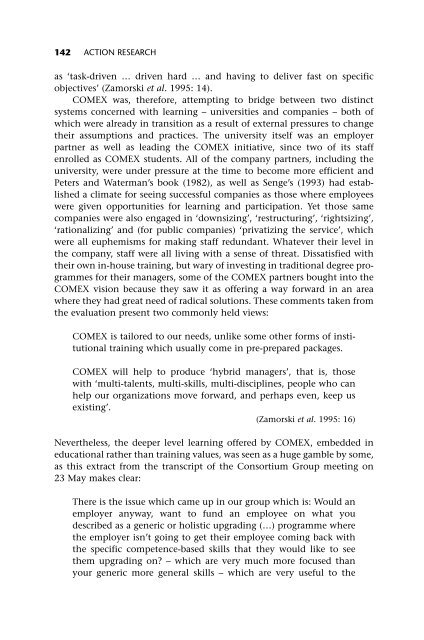Action Research A Methodology for Change and Development
Action Research A Methodology for Change and Development
Action Research A Methodology for Change and Development
Create successful ePaper yourself
Turn your PDF publications into a flip-book with our unique Google optimized e-Paper software.
142 ACTION RESEARCH<br />
as ‘task-driven … driven hard … <strong>and</strong> having to deliver fast on specific<br />
objectives’ (Zamorski et al. 1995: 14).<br />
COMEX was, there<strong>for</strong>e, attempting to bridge between two distinct<br />
systems concerned with learning – universities <strong>and</strong> companies – both of<br />
which were already in transition as a result of external pressures to change<br />
their assumptions <strong>and</strong> practices. The university itself was an employer<br />
partner as well as leading the COMEX initiative, since two of its staff<br />
enrolled as COMEX students. All of the company partners, including the<br />
university, were under pressure at the time to become more efficient <strong>and</strong><br />
Peters <strong>and</strong> Waterman’s book (1982), as well as Senge’s (1993) had established<br />
a climate <strong>for</strong> seeing successful companies as those where employees<br />
were given opportunities <strong>for</strong> learning <strong>and</strong> participation. Yet those same<br />
companies were also engaged in ‘downsizing’, ‘restructuring’, ‘rightsizing’,<br />
‘rationalizing’ <strong>and</strong> (<strong>for</strong> public companies) ‘privatizing the service’, which<br />
were all euphemisms <strong>for</strong> making staff redundant. Whatever their level in<br />
the company, staff were all living with a sense of threat. Dissatisfied with<br />
their own in-house training, but wary of investing in traditional degree programmes<br />
<strong>for</strong> their managers, some of the COMEX partners bought into the<br />
COMEX vision because they saw it as offering a way <strong>for</strong>ward in an area<br />
where they had great need of radical solutions. These comments taken from<br />
the evaluation present two commonly held views:<br />
COMEX is tailored to our needs, unlike some other <strong>for</strong>ms of institutional<br />
training which usually come in pre-prepared packages.<br />
COMEX will help to produce ‘hybrid managers’, that is, those<br />
with ‘multi-talents, multi-skills, multi-disciplines, people who can<br />
help our organizations move <strong>for</strong>ward, <strong>and</strong> perhaps even, keep us<br />
existing’.<br />
(Zamorski et al. 1995: 16)<br />
Nevertheless, the deeper level learning offered by COMEX, embedded in<br />
educational rather than training values, was seen as a huge gamble by some,<br />
as this extract from the transcript of the Consortium Group meeting on<br />
23 May makes clear:<br />
There is the issue which came up in our group which is: Would an<br />
employer anyway, want to fund an employee on what you<br />
described as a generic or holistic upgrading (…) programme where<br />
the employer isn’t going to get their employee coming back with<br />
the specific competence-based skills that they would like to see<br />
them upgrading on? – which are very much more focused than<br />
your generic more general skills – which are very useful to the

















